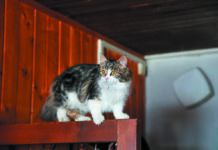Veterinary practices report that during the summer months, they see significantly more cats who have injured themselves falling out of windows. These emergencies occur across the globe. Austrian veterinarian Dr. Roswitha Steinbacher has reported that every year during the warmer months, the Clinic for Small Animals at the University of Veterinary Medicine in Vienna treats some 70 to 80 cats suffering from bone fractures or internal injuries following open-window accidents. In the U.S., injurious warm-weather feline falls from windows, balconies, and fire escapes are frequent enough that veterinarians have a name for the problem: high-rise syndrome.
Cats don’t “jump” from high places, says the ASPCA. Rather, their incredible ability to focus — on a bird, an insect, something else — makes them distracted, so they lose their footing. And, contrary to popular belief, serious wounds can ensue — everything from the bursting of lung tissue that causes air to leak into the chest to a broken leg or pelvis, shattered jawbone, teeth fractures, and traumatic brain injuries.
It’s true that cats have an incredible ability to right themselves midair so that they land on their feet. But if they are falling only two or three stories, they may not have the time to regain their balance. And whether falling from the second floor or the tenth, their agility doesn’t always protect them. Consider that when a cat falls from a high floor, he might be able to correct his body position and land on his feet, “but often their legs can’t hold the bounce,” Dr. Steinbacher points out. “Their joints are heavily bended, single bones break, and the cat’s head and thorax [chest] hit the ground.” A study at the veterinary clinic in Vienna suggests accidents are more frequent among younger cats. And male cats are the ones who tend to fall from very high places. But no cat is danger-free.
Safety measures are critical
In Austria, cat owners are legally bound to protect their cats from plunging from windows or balconies. It’s not hard to do. Make sure all your windows have screens that you keep down, and be certain that they’re all installed snugly and tightly. Furthermore, if they are adjustable, they need to be tightly wedged into window frames.
Firmly push your hand against all your window screens. If they are not properly secured, you might be surprised at how easily some of them pop out. (Note: childproof window guards do not provide adequate protection — cats can slip through them.)
Fire escapes should be off limits along with open windows. So should balconies, terraces, and lanais that cannot be adequately secured with a grill or that a cat can jump to and then perch on.
If your cat does fall out of a window or from another spot, take him to the veterinarian right away, even if it was from a low floor. You want to make sure he doesn’t have any internal injuries or other problems that you might not be able to detect on your own.
Fortunately, there is a 90 percent survival rate for feline high-rise victims if they receive immediate and proper attention, according to a study in the Journal of the American Veterinary Medical Association. Unfortunately, the cost of treatment in serious cases can range from $2,000 to more than $5,000. Pets who have sustained injuries might require supplemental oxygen therapy, a surgery or two, and perhaps a temporary feeding tube, along with heavy doses of medication to relieve severe pain. It’s much better to go the prevention route than the treatment route.




